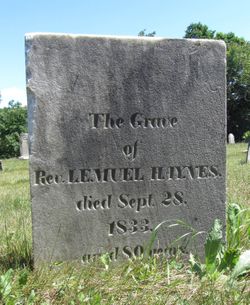First published in the William & Mary Quarterly in 1985, this poem has been partially reprinted in some textbooks. However, I’ve found the whole thing in only one anthology and no websites. So, in the interest of completeness, here are the remaining verses.
23This poem survived as a manuscript in Haynes’s handwriting. A lot of words are crossed out. One whole verse was composed, shifted, and finally rewritten for another place in the poem. (Except for the introductory line yesterday, I didn’t indicate the earlier language, but it all appears in the William & Mary Quarterly.) Thus, this was almost certainly Haynes’s working manuscript.
Altho our Numbers were but few
And they a Num’rous Throng
Yet we their Armies do pursue
And drive their Hosts along
24
One Son of Freedom could annoy
A Thousand Tyrant Fiends
And their despotick Tribe destroy
And chace them to their Dens
25
Thus did the Sons of Brittain’s King
Recieve a sore Disgrace
Whilst Sons of Freedom join to sing
The Vict’ry they Imbrace
26
Oh! Brittain how art thou become
Infamous in our Eye
Nearly allied to antient Rome
That Seat of Popery
27
Our Fathers, tho a feeble Band
Did leave their native Place
Exiled to a desert Land
This howling Wilderness
28
A Num’rous Train of savage Brood
Did then attack them round
But still they trusted in their God
Who did their Foes confound
29
Our Fathers Blood did freely flow
To buy our Freedom here
Nor will we let our freedom go
The Price was much too dear
30
Freedom & Life, O precious Sounds
yet Freedome does excell
and we will bleed upon the ground
or keep our Freedom still
31
But oh! how can we draw the Sword
Against our native kin
Nature recoils at such a Word
And fain wd. quit the Scene
32
We feel compassion in our Hearts
That captivating Thing
Nor shall Compassion once depart
While Life retains her String
33
Oh England let thy Fury cease
At this convulsive Hour
Consult those Things that make for Peace
Nor foster haughty Power
34
Let Brittain’s king call home his Band
of Soldiers arm’d to fight
To see a Tyrant in our Land
Is not a pleasing Sight
35
Allegiance to our King we own
And will due Homage pay
As does become his royal Throne
Yet in a legal Way
36
Oh Earth prepare for solemn Things
Behold an angry God
Beware to meet the King of Kings
Arm’d with an awefull Rod
37
Sin is the Cause of all our Woe
That sweet deluding ill
And till we let this darling go
There's greater Trouble still
In her article on the first publication, Ruth Bogin deduced that Haynes wrote the poem in the spring of 1775 because he complained about the regulars’ actions in the Battle of Lexington and Concord but didn’t mention the greater destruction of Bunker Hill.
The poem also matches the political situtation early in the war, when American colonists still proclaimed their loyalty to King George III and appealed to him to reverse his ministers’ policies.
As we should expect from a future minister raised in a rural New England deacon’s household, these lines reflect a Congregationalist outlook on the conflict, fusing the current political crisis with the Last Judgment. In metre and length, the poem echoes common hymns.
That outlook is why Haynes described the royal government as “Nearly allied to…That Seat of Popery,” as if all oppression stemmed from Rome. Three years later, the U.S. of A. would sign a treaty with Catholic France, making that sentiment less tenable.
(The photo above shows the Rev. Lemuel Haynes’s grave in Granville, New York, courtesy of Find a Grave.)

No comments:
Post a Comment